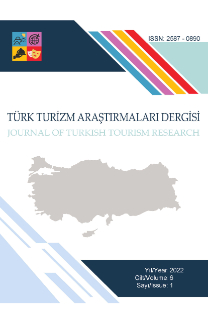Gastronomi Eğitimi Alan Öğrencilerin İşletme Mutfaklarına Yönelik Tutumları
Attitudes Towards Business Kitchens of Gastronomy Students
___
- Akgün, M. (2013). Gözü Mutfakta, Aklı Şeflikte Olanlara. www.radikal.com.tr [Erişim Tarihi: 28.08.2019].
- Allen, G. (2003). Education About Food. In the Encyclopedia of Food and Culture, (Vol. l, pp. 556- 558). New York: Encyclopaedia of Food and Culture.
- Airey, D. and Frontistis, A. (1997). Attitudes to Carreers in Tourism: An Anglo Greek comparison. Tourism Management. 18(3): 149–158.
- Arman, A. ve Şahin, T. (2013). Anadolu Otelcilik ve Turizm Meslek Lisesi Öğrencilerinin Stajlarında İşletmelerden Beklentileri: Mengen Aşçılar Anadolu Otelcilik ve Turizm Meslek Lisesi Örneği. Uşak Üniversitesi Sosyal Bilimler Dergisi. 2: 13-24.
- Brown, J. (2013). A Brief History of Culinary Arts Education in America, Journal of Hospitality & Tourism Education, 17(4): 47-54.
- Çemrek, F. ve Yılmaz, H. (2010). Turizm ve Otel İşletmeciliği ile Aşçılık Programı Öğrencilerinin Uygulamalı Mutfak Dersleri Hakkında Tutum ve Düşüncelerini Ölçmeye Yönelik Bir Uygulama. Sosyal Bilimler Dergisi. 2: 203-220.
- Denizer, D. (2008). Türk Turizmin Gelişmesinde Türk Mutfağının Önemi ve Bugün İçin Yapılması Gerekenler. 2.Ulusal Gastronomi Sempozyumu Bildirisi. Alanya.
- Görkem, O. ve Sevim, B. (2016). Gastronomi Eğitiminde Geç mi Kalındı Acele mi Ediliyor? Elektronik Sosyal Bilimler Dergisi. 15 (58): 977-988.
- Güler, S. ve Olgaç, S. (2010). Lisans Düzeyinde Eğitim Gören Öğrencilerin Türk Mutfağının Tanıtım ve Pazarlanmasına İlişkin Görüşleri (Anadolu Üniversitesi Turizm ve Otel İşletmeciliği Yüksekokulu Örneği), Dumlupınar Üniversitesi Sosyal Bilimler Dergisi. 28: 227-238.
- Hall, M. and Mitchell, R. (2005). Gastronomic Tourism: Comparing Food and Wine Tourism Experiences: Niche Tourism. Contemporary Issues, Trends and Cases, 89-100.
- Hegarty, J.A. (2011). Achieving Excellence by Means of Critical Reflection and Cultural Imagination in Culinary Arts and Gastronomy, Education Journal of Culinary Science & Technology, 9, (55-65).
- Kurnaz, A., Akyurt Kurnaz, H. ve Kılıç, B. (2014). Önlisans Düzeyinde Eğitim Alan Aşçılık Programı Öğrencilerinin Mesleki Tutumlarının Belirlenmesi. Muğla Sıtkı Koçman Üniversitesi, Sosyal Bilimler Enstitüsü Dergisi. 32: 41-61.
- Kuşluvan, S. and Kuşluvan, Z., (2000). Perceptions and Attitudes of Undergraduate Tourism Students Towards Working in The Tourism Industry in Turkey. Tourism Management, 3: 251-269.
- Kutukız, D., Akyürek, S. ve Özdemir, Ö. (2018). Turizm Eğitimi Alan Orta Öğretim Düzeyindeki Öğrencilerin Mutfak Departmanına Yönelik Tutumlarını Belirlemeye Yönelik Bir Araştırma, Uluslararası Toplum Araştırmaları Dergisi, 8 (8); 127-146.
- Locke, Edwin A. (1976). The Nature and Causes of Job Satisfaction. İçinde M. Dunette (Ed.),
- Handbook of Industrial and Organizational Psychology, Chicago: Rand McNally, ss. 1297-1343.
- Öney, H. (2016). Gastronomi Eğitimi Üzerine Bir Değerlendirme. Selçuk Üniversitesi Sosyal Bilimler Enstitüsü Dergisi. 35: 193-203.
- Ösym, 2019. https://yokatlas.yok.gov.tr/lisans-bolum.php?b=19024 [Erişim Tarihi:12.10.2019].
- Santich, B. (2004). The study of gastronomy and its relevance to hospitality education and training. International Journal of Hospitality Management. 23(1): 15-24.
- Şengün, S. (2017). Gastronomi Eğitimi ve Gastronomide Kariyer. M. Sarıışık, (Ed.), Tüm Yönleriyle Gastronomi Bilimi içinde (169-186). Ankara: Detay Yayıncılık.
- Tekin, Ö.A. ve Çidem, G. (2015). Turizm Öğrencilerinin Mutfak Departmanına Yönelik Tutumları Ölçeği: Bir Geçerlik ve Güvenirlik Çalışması, Uluslararası Sosyal Araştırmalar Dergisi, 8 (39): 975- 986.
- Toker, B. (2007). Demografik Değişkenlerin İş Tatminine Etkileri: İzmir’deki Beş ve Dört Yıldızlı Otellere Yönelik Bir Uygulama. Doğuş Üniversitesi Dergisi. 8 (1): 92-107.
- Yılmaz, H. ve Ekincek, S. (2016). Gurmeler ve İletişim. H. Yılmaz, (Ed.), Bir İletişim Biçimi Olarak Gastronomi içinde (115-138). Ankara: Detay Yayıncılık
- ISSN: 2587-0890
- Yayın Aralığı: Yılda 4 Sayı
- Başlangıç: 2017
- Yayıncı: Prof. Dr. Yüksel ÖZTÜRK
Amasya İlindeki İbadethanelerin İnanç Turizmi Potansiyeli Açısından Değerlendirilmesi
Destinasyon Markası Oluşumunda Gastronomik Kimlik ve İmaj: Konya Örneği
Burcu Ayşenur AKBULUT, İrfan YAZICIOĞLU
Planlı Davranış Teorisi ve Turizm Üzerine Yapılan Uluslararası Yayınların Bibliyometrik Analiz
OĞUZ NEBİOĞLU, M. Bahadır KALIPÇI
Aşçıların Tükenmişlik Düzeylerinin Belirlenmesine Yönelik Kars İlinde Bir Araştırma
Serkan NAKTİYOK, Erman KAYGIN, Ethem TOPÇUOĞLU
Turistik Destinasyonlarda Talep Yönetimi ve Demarketing Uygulamaları
Ayurveda Beslenme Sistemine Uygun Türk Mutfağı Örnek Menü Planlaması
Dilek ÇİFTCİ, ELİF DORMAN, Özgür KIZILDEMİR
Türk Mutfak Kültüründe Bulgurun Yeri ve Önemi
Sakin Şehirlerde Sürdürülebilirliğin Metaforik Açıdan Karşılaştırılması
İbrahim Taner AKKOÇ, EMRE OZAN AKSÖZ
Destinasyonda Markalaşma Yolunda Şanlıurfa İçin Bir Model Önerisi
Safranbolu’da Sürdürülebilir Turizm Gelişmesine Yönelik Yerel Halkın Tutumları
